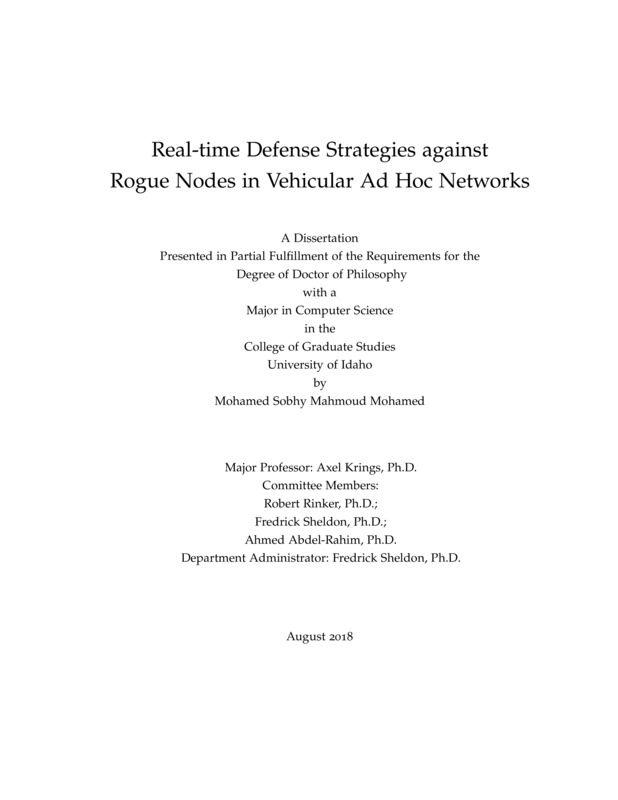Real-time Defense Strategies against Rogue Nodes in Vehicular Ad Hoc Networks
Mohamed, Mohamed Sobhy Mahmoud. (2018-08). Real-time Defense Strategies against Rogue Nodes in Vehicular Ad Hoc Networks. Theses and Dissertations Collection, University of Idaho Library Digital Collections. https://www.lib.uidaho.edu/digital/etd/items/mohamed_idaho_0089e_11424.html
- Title:
- Real-time Defense Strategies against Rogue Nodes in Vehicular Ad Hoc Networks
- Author:
- Mohamed, Mohamed Sobhy Mahmoud
- Date:
- 2018-08
- Program:
- Computer Science
- Subject Category:
- Computer science
- Abstract:
-
Intelligent Transportation Systems provide technologies, services, and applications that allow wireless communication between vehicles, and between vehicles and the roadside infrastructure using Dedicated Short Range Communications (DSRC). This collaborative communication forms a Vehicular Ad-Hoc Network (VANET). The most important applications in VANET are DSRC Safety Applications, which play a significant role in reducing road accidents. As these applications rely on wireless communication they inherit all of the associated security problems. VANET security is crucial, since application reliability, and thus safety, must not be compromised. Rogue nodes can severely affects the reliability of applications by sharing or injecting false data in the network. They may even launch Sybil attacks, in which a rogue node pretends to be multiple nodes by impersonating their identities, potentially causing
serious problems. In this dissertation, defense strategies against rogue nodes in vehicular networks are proposed, which improve the reliability of safety applications operating in hostile environments. These strategies take advantage of certain properties of a new hybrid jammer, which is introduced to cause safety applications to fail. First, a detection algorithm for the new hybrid jammer is presented. Then an enhanced voting-based algorithm is shown, which is capable of significantly reducing the decision times of safety applications to alert drivers. Next, passive and active Sybil attack detection algorithms are introduced, which enhance the resilience against Sybil attacks in static and dynamic power environments respectively. Finally, an enhanced active Sybil detection algorithm is introduced and its impact on DSRC safety applications is analyzed. The defense strategies and their effectiveness were investigated using simulations and field experiments. The latter used vehicles equipped with commercial DSRC equipment. The experimental results show that the defense strategies have significant impact on enhancing the reliability of safety applications in the presence of attacks. In addition, all algorithms proposed in this research comply with current protocols and do not require modifications to existing standards.
- Description:
- doctoral, Ph.D., Computer Science -- University of Idaho - College of Graduate Studies, 2018-08
- Major Professor:
- Krings, Axel
- Committee:
- Rinker, Robert; Sheldon, Fredrick; Abdel-Rahim, Ahmed
- Defense Date:
- 2018-08
- Identifier:
- Mohamed_idaho_0089E_11424
- Type:
- Text
- Format Original:
- Format:
- application/pdf
- Rights:
- In Copyright - Educational Use Permitted. For more information, please contact University of Idaho Library Special Collections and Archives Department at libspec@uidaho.edu.
- Standardized Rights:
- http://rightsstatements.org/vocab/InC-EDU/1.0/

